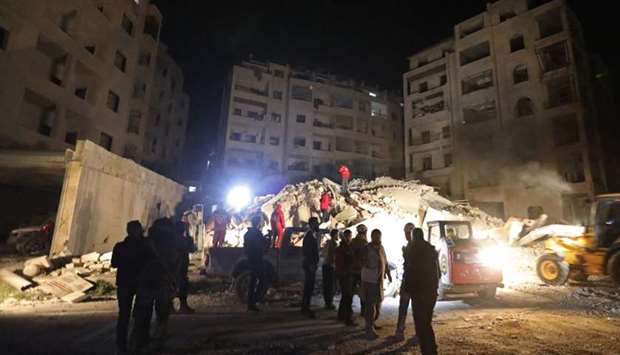The region of Eastern Ghouta is home to an estimated 400,000 people living under a crippling government siege that has made food and medicine almost impossible to acquire.
The area has been designated as one of four de-escalation zones in Syria, but residents there have been facing escalating bombardment in recent weeks.
"Dozens of air strikes hit several areas in Eastern Ghouta," said Rami Abdel Rahman, head of the Britain-based Syrian Observatory for Human Rights monitor.
The deadliest raids on Monday hit a market in the town of Beit Sawa, killing 10 civilians including two children.
Another nine civilians, two of them children and one a local rescue worker, were killed in Arbin.
Nine more civilians died in strikes across the rest of the besieged region, and dozens more people were wounded, the Observatory said.
The barrage of bombardment came as the United Nations children's agency warned of the dire risks to children in the Middle East's war zones.
At least 83 children were killed in conflicts across the region in January -- including 59 in Syria alone.
And four Syrian children were among at least 16 refugees who froze to death in a snowstorm as they tried to flee to neighbouring Lebanon.
- Sobbing silently -
In Arbin on Monday, an AFP correspondent saw the lifeless bodies of young children laid out on the floor in the local hospital.
One of the dead was a member of a volunteer rescue force in the town, and a group of his colleagues could be seen crying over him.
Outside, a man sat sobbing silently atop a pile of rubble after having lost two of his family members in the raids.
AFP correspondents reported that air strikes began at around 10:00 am (0800 GMT) on Monday, and airplanes could still be heard circling above in the afternoon.
In apparent retaliation, rockets and mortars rained down on government-controlled districts of Damascus, Syria's state news agency SANA reported.
One woman was killed and four people were wounded in mortar fire on the Bab Touma neighbourhood and the capital's Mariamite Cathedral, a Greek Orthodox church, a police source told the agency.
Another person was killed and nine people wounded in rocket fire on the regime-held part of Harasta district.
Syria's war has killed more than 340,000 people and displaced millions since it began in March 2011 with the brutal repression of anti-government protests.
Chlorine accusations
Eastern Ghouta is supposed to be one of four de-escalation zones agreed last year by rebel ally Turkey and government supporters Iran and Russia.
But violence has ramped up there in recent weeks, with at least 11 civilians killed in raids on the district on Friday.
This month alone, chlorine is suspected of having been used on two occasions in munitions launched by the regime on Eastern Ghouta, causing respiratory problems among civilians.
Accusations of toxic gas use have also come from Idlib, an opposition-controlled province in the country's northwest that also falls in a de-escalation zone.
Syrian troops have pressed a fierce offensive on Idlib for more than a month with air cover from Russian warplanes.
Nearly a dozen people were treated for breathing difficulties on Sunday after Syrian government raids on the town of Saraqeb, the Observatory said.
Mohammad Ghaleb Tannari, a doctor in a nearby town, said his hospital had treated 11 people.
"All the cases we received had symptoms consistent with inhaling the toxic gas chlorine, including exhaustion, difficulty breathing, and coughing," he told AFP.
The United Nations has found that Syria's government carried out chlorine gas attacks in 2014 and 2015 and also used sarin against a town in Idlib last year.
Syria's government has vehemently denied ever using chemical weapons.
Another 16 civilians were killed across southern parts of Idlib on Sunday, the Observatory said in an updated toll.

